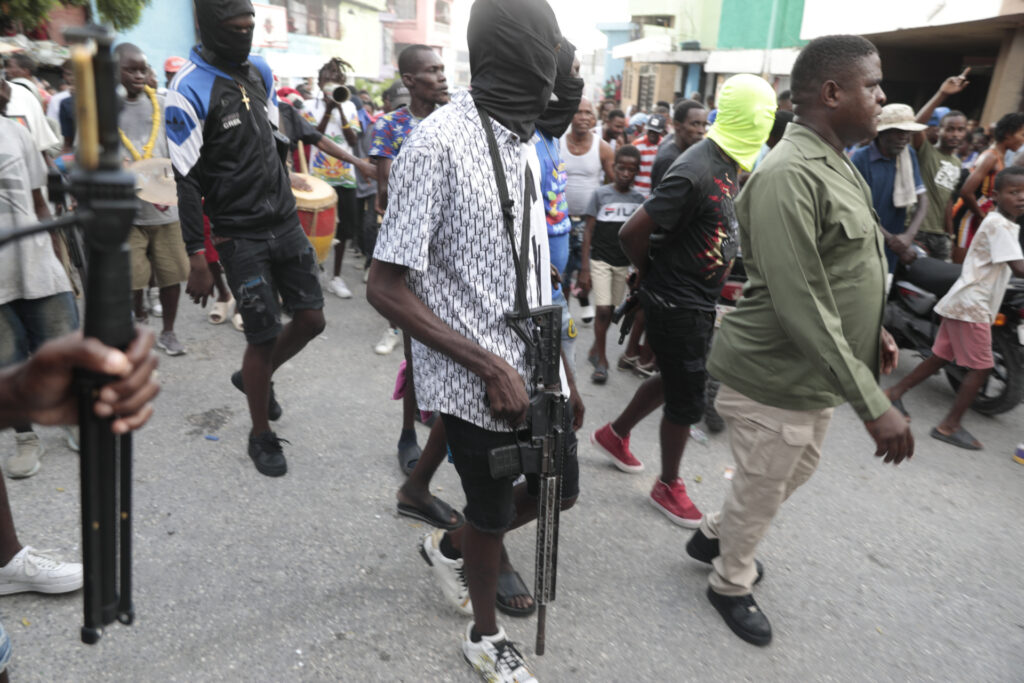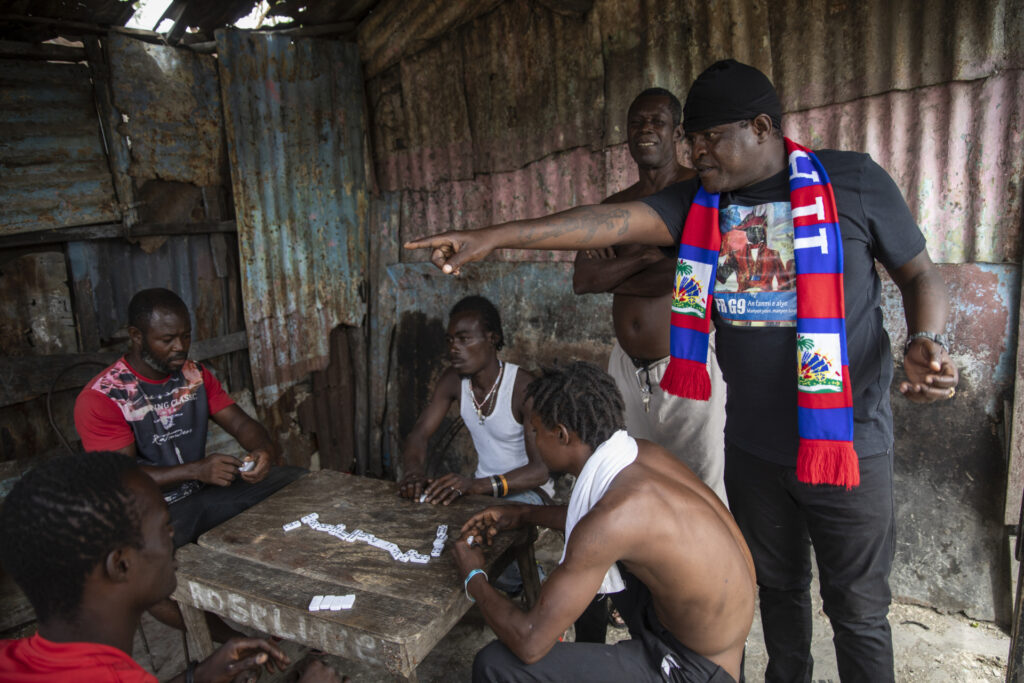Haitian gang boss Jimmy “Barbecue’ Cherizier hit the streets on Tuesday to call for an armed revolution against the government of Prime Minister Ariel Henry.
“Our fight will be with weapons,” he assured the media.
Reuters observed Cherizier marching through the streets with a squad of heavily armed goons. He vowed that demonstrations would be held daily in “all working-class neighborhoods” against Henry’s administration, which he deemed illegitimate.
Cherizier rejected Henry’s call for international assistance to defeat the gangs and stabilize Haiti. He warned other countries to stay out of Haiti while he works on overthrowing the government.
“The international community cannot continue to do this in Haiti. If the international community has nothing to do with (President Jovenel Moise’s) death, they must not support Ariel Henry,” he told Reuters.
Moise was assassinated in his home in July 2021 by a squad of gunmen. Haiti was thrown into even more chaos than usual by his death, and Henry stepped in to fill the power vacuum. Haiti has not had a president since.
Cherizier is not alone in questioning the legitimacy of Henry’s rule, since he has not stood for an election yet. Haiti’s last elected officials departed in January 2023 as their terms expired.

Members of “G9 and Family” protect the leader Jimmy Chérizier, right, better known as Barbecue, during a protest against Haitian Prime Minister in Port-au-Prince, Haiti, Tuesday, Sept. 19, 2023. (AP Photo/Odelyn Joseph)
In February, Henry created a “transition council” that was supposed to pave the way for the first elections since Moise’s murder. No date has been set for elections as of September 2023.
One of the many reasons other countries, including the United States, have been reluctant to commit ground forces to restore order in Haiti is that so much of the populace regards Henry as illegitimate, and might turn against their would-be foreign saviors because they would accuse foreign peacekeepers of propping up Henry’s rule.
Cherizier made that threat explicit on Tuesday.
“Every Ghetto will be on the streets every day, and we have nothing to hide from the whole world. They all know that we have weapons. Not only do we mobilize to fight Ariel Henry, we also mobilize the people,” he said.
Haitians may not support Henry, but they do not much care for anarchic rule by gang lords, either. A vigilante movement called “Bwa Kale” (a phrase that means “peeled wood,” a euphemism for street justice) has risen up against the gangs and killed a number of suspected gang members.
The gangs responded with brutal violence, as in August, when they opened fire on a church group that marched through the streets with clubs and machetes after their pastor told them their faith made them bulletproof. They quickly discovered that they were not.
Cherizier, widely regarded as the most powerful of Haiti’s crime lords, is a former police officer who was allegedly involved with brutal gang violence long before he lost his badge. He was slapped with human rights sanctions by the U.N. Security Council in October 2022.
Cherizier leads a consortium of violent gangs called the “G9 Family and Allies,” a name chosen as a mockery of legitimate international organizations like the G7 and G20. Cherizier’s organization notoriously took control of Haiti’s vital fuel terminal in September 2022, holding the entire island’s fuel supply hostage for two months and inflicting unimaginable suffering on its already impoverished people.

File/Jimmy Cherizier, aka Barbecue, a former policeman who leads the G9 gang coalition, visits with friends as they play a game of dominoes in the Cite Soleil shantytown of Port-au-Prince, Haiti, Sunday, Oct. 3, 2021. (AP Photo/Rodrigo Abd)
The island remains wracked by violence, poverty, disease, and famine, which is spreading because Cherizier and his fellow gang lords are blockading the roads needed for food distribution.
The reason Cherizier takes pains to mourn Moise in his public statements is not because he longs for legitimate representative government to return to Haiti, but because Moise was believed to be a patron and ally to the G9 gangs. The criminal organization originally presented itself as a volunteer militia and ballot harvesting operation, and Moise allegedly supplied them with cash and weapons.
After years of the American, Canadian, and Caribbean governments awkwardly eyeballing each other and hoping someone else would take point on the Haitian peacekeeping operation demanded by U.N. Secretary-General Antonio Guterres, Kenya stepped forward in July and announced it would send a thousand police officers to the island.
The Miami Herald reported in September that Biden administration officials have been “circling the globe” in a frantic effort to recruit other countries to back Kenya up with a multinational peacekeeping force.
SHOCK VIDEO: Nearly 400 People Rescued from “Unsafe, Overloaded” Haitian Sailboat
U.S. Coast Guard District 7
Those efforts have been largely unsuccessful, in part because no one will commit troops until the U.N. Security Council authorizes a military intervention, and resolutions to that effect have been blocked by Russia and China.
Kenya’s offer turned out to have a good deal of fine print, including some confusion about exactly what its forces would do after arriving in Haiti. On Wednesday, Kenyan President William Ruto established formal diplomatic relations with Haiti and said he still plans to send Kenyan personnel to the island – but only if the U.N. officially endorses the mission and other nations commit troops as well.
“As the leading nation in the U.N.-backed security mission in Haiti, we are committed to deploying a specialized team to comprehensively assess the situation and formulate actionable strategies that will lead to long-term solutions,” Ruto said on Wednesday.
“Kenya is ready to pay its part in full and join with a coalition of other nations of good will, and there are many, as a good friend and true sibling of Haiti,” he reiterated in his address to the U.N. General Assembly on Thursday.
“We urge the United Nations to urgently deliver an appropriate framework to facilitate the deployment of a multinational security support as part of a holistic response to Haiti’s challenge,” he said.
“As we mobilize to show up for Ukraine, and countries that have experienced the devastating impact of climate shocks including Libya, Morocco and Hawaii, we must not leave Haiti behind,” he declared.
Haiti specialist Diego Da Rin of the International Crisis Group told the UK Guardian on Thursday that peacekeepers might arrive in Haiti by November or December if the U.N. passes the desired resolution.
The Haitian police announced on Monday that residents of the capital city, Port-au-Prince, overpowered a group of suspected gang members and executed them on the spot by hanging them and setting them on fire. https://t.co/Jwm2xfm4nz
— Breitbart News (@BreitbartNews) April 26, 2023
“We expect a force of around 2,000 police officers, maybe with some military backup units. It won’t be as huge as previous armed interventions,” he said.
The Guardian found little enthusiasm for the prospective peacekeeping operation on the streets of Haiti, where residents doubted a small force of foreign police officers would make much of a difference until Haiti had a functional and reasonably honest government.
“One of the reasons the gangs are powerful today is because the state authorities at the highest echelons and the police hierarchy are colluding with bandits. In order to improve the security situation, the country has to be led,” human rights activist Pierre Esperance told the Guardian.
Another problem is that Kenya’s police force has been sharply criticized for its own human rights violations, including beating and killing demonstrators from impoverished neighborhoods who protested higher costs of living.
The Guardian noted in August that Kenyan peacekeepers have proven ineffective in deployments like Somalia, where the Kenyans were accused of corruption for supporting smuggling rings.
“With armed groups extorting much of Haiti’s business and corruption penetrating the highest levels of politics and policing, any external force is likely to become entangled in Haiti’s criminal economy,” the Guardian cautioned.


